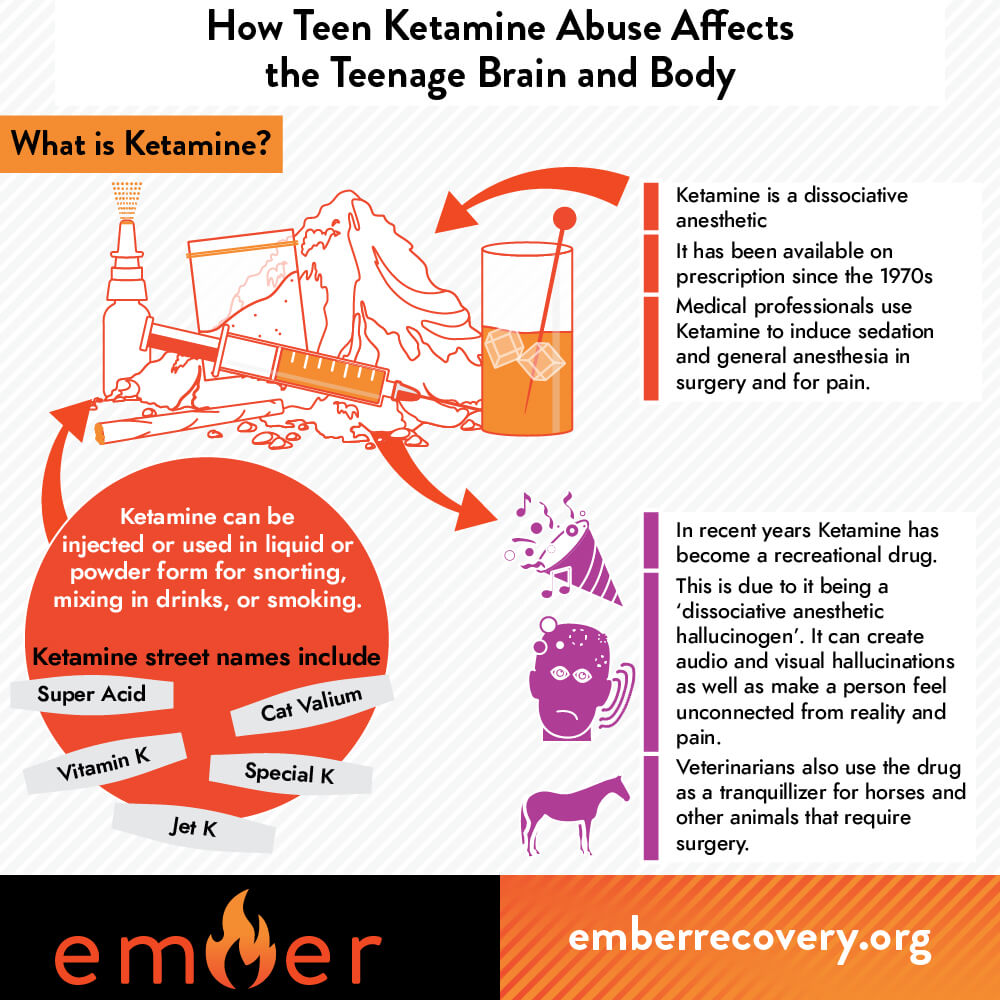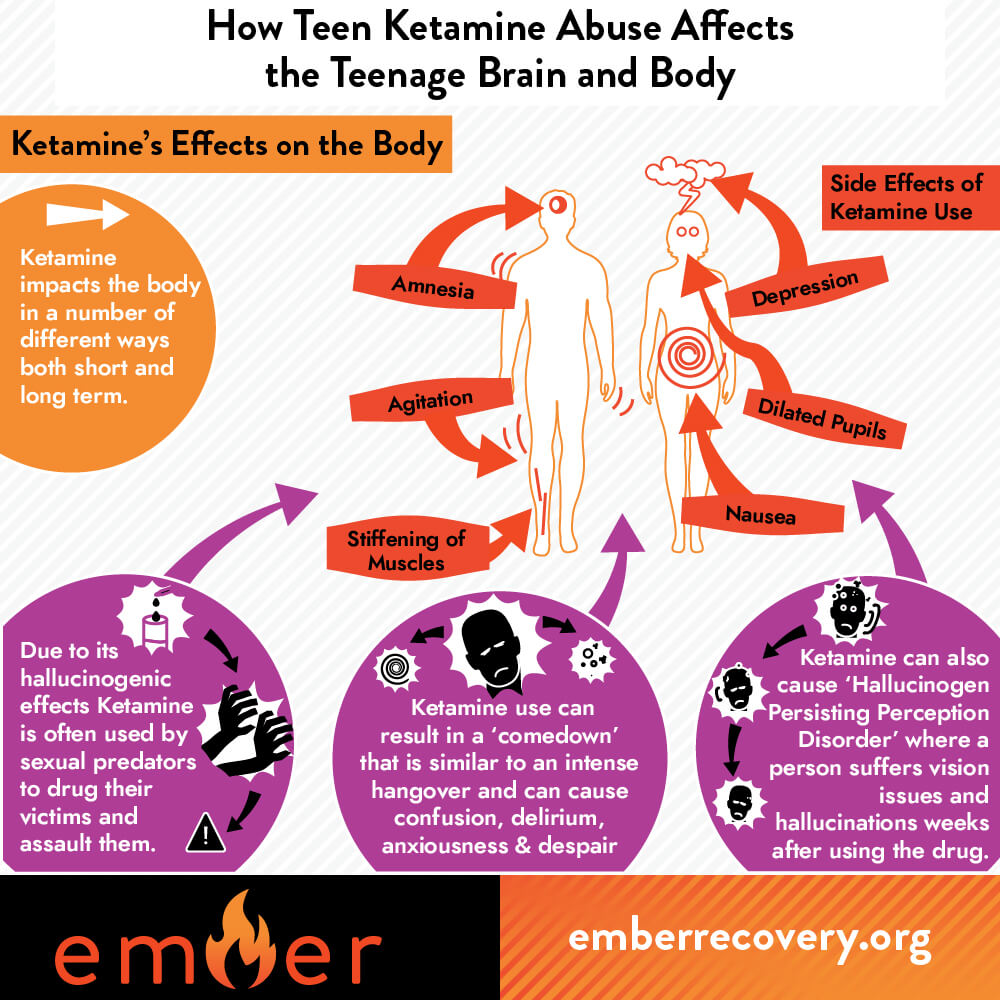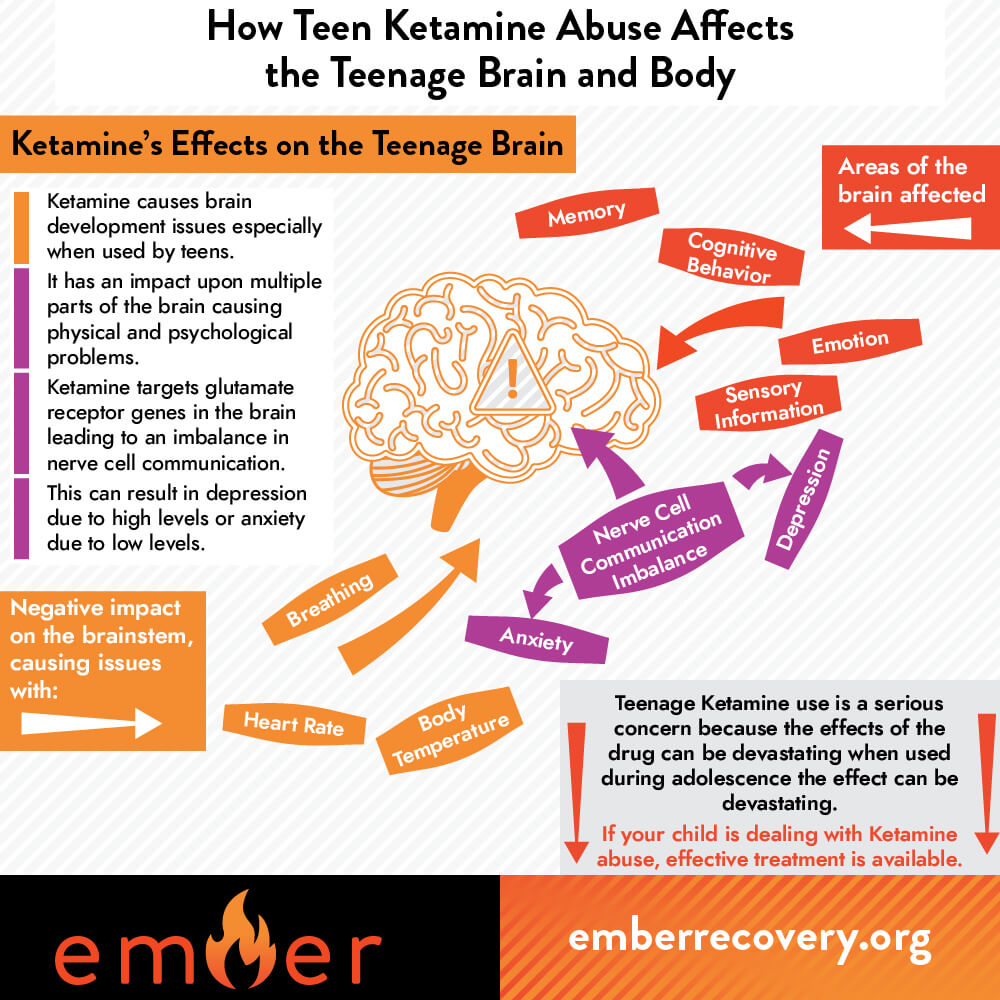Previously reserved for doctor and veterinarian use, Ketamine has now become a popular party drug among teens. Teen Ketamine abuse is a concern because of the damaging short-term and long-term effects it can have.
As we take a look at how Ketamine impacts the teenage body and its effects on the brain, we’ll also examine why it’s so crucial for teens to get help, as soon as possible.
What is Ketamine?
Ketamine is a dissociative anesthetic that has been available as a prescription since the 1970s.1 Licensed medical professionals use Ketamine to induce sedation and general anesthesia in surgery and for pain. Veterinarians also use Ketamine as an effective horse tranquilizer and anesthetic for animals that need medical procedures.
Over recent years, Ketamine has also become a recreational drug due to its hallucinogenic effects. Using it can distort sight and sound perception and make the user feel disconnected. Ketamine has been called a “dissociative anesthetic hallucinogen” because of the way it makes people feel detached from their pain and their surroundings.1
Ketamine can be injected and used as a liquid or powder that is snorted, mixed in drinks, or smoked. It is popular among teens because it is cheaper than some other drugs. It has several street names, such as Special K, Vitamin K, Jet K, Cat Valium, and Super Acid, just to name a few.
Ketamine’s Effects on the Body
Ketamine has hallucinogenic effects as it distorts perceptions of sight and sound. Because of this, sexual predators often use Ketamine to drug their victims and assault them.2
Ketamine can also produce side effects such as:
- Agitation
- Depression
- Amnesia
- Dilated pupils
- Stiffening of muscles
- Nausea
Even after people use Ketamine briefly, they can experience a “comedown” from their high. This is similar to a hangover and can be very intense. When this happens, users can become confused and delirious, they can also feel anxious and hopeless.
Hallucinogen Persisting Perception Disorder is also a concern. This can occur several weeks after someone has used Ketamine, including prolonged vision problems.
Ketamine’s Effects on the Teenage Brain
Ketamine can also impact the brain and cause developmental issues. Long-term use has been associated with an increase in memory loss and depression. Several parts of the brain can be impacted, including those that control cognitive behavior, emotion, and memory and those that process sensory information. The brainstem, which regulates breathing, heart rate, and body temperature, can be impacted. One study showed severe damage to brain cells in people who used Ketamine for four years.3
Ketamine targets glutamate receptor genes in the brain, which can lead to an imbalance in the area of the brain that regulates nerve cell communication. Any changes in this area can lead to mental illness and depression. High levels can result in depression, while low levels can lead to anxiety.
The impact ketamine can have on the brain is one of the main reasons why teenage ketamine abuse is so serious. If teens start using the drug when they are young and continue through adolescence, the effects can be extremely dangerous.
Get Help for Teen Ketamine Abuse at Ember Recovery
If your child has a problem with teen Ketamine abuse, let the staff at Ember Recovery help. We have helped more than 5,000 teens across Iowa battle their drug addiction. Our center deals exclusively with teenagers and the issues that go along with teen substance abuse problems.
We tailor each treatment plan to suit each patient because we understand that people respond to treatments differently. From residential programs for boys and girls to detox referrals, Ember Recovery has the tools necessary to help your teenager.
For more information on our programs, call us today or message us online.
Sources:
[1] https://www.dea.gov/factsheets/ketamine [2] https://www.justice.gov/archive/ndic/pubs4/4769/4769p.pdf [3] https://www.ncbi.nlm.nih.gov/pmc/articles/PMC3713393/
Andrea Dickerson is a Licensed Therapist and Certified Substance Use Counselor who has worked in behavioral health since 1997. Currently, Andrea is the Director of Behavioral Health, overseeing the Ember residential treatment programs and YSS outpatient counseling clinics throughout Central and North Central Iowa. She became a Motivational Interviewing (MI) trainer in 2006 and provides MI trainings throughout Iowa.
Andrea specializes in working with adolescents and their families and enjoys seeing the family relationships grow through therapy. Andrea is also a CARF International Surveyor, going around North America ensuring behavioral health organizations are meeting required standards.
In her free time, Andrea enjoys cheering on the Iowa Hawkeyes and Chicago Cubs, as well as being an active member of Soroptimist International of the Americas (SIA), a global organization that provides women and girls with access to the education and training they need to achieve economic empowerment. She has been a member of the SI of Des Moines club since 2012 and has been actively involved at the regional level, currently serving as Co-Governor of the Peaks to Plains Region.
Through her involvement in SIA, Andrea has been actively involved in the Dream Programs, coordinating annual Dream It, Be It: Career Support for Girls projects, which give girls the tools they need to achieve their education and career goals, empowering them to break cycles of poverty, violence, and abuse.



